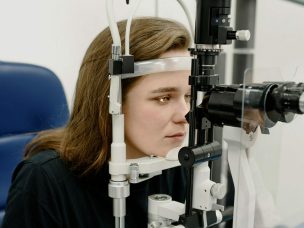August 1, 2023
Managing Eye Conditions While Living With Atopic Dermatitis
Medically reviewed by Dr. Samuel Sarmiento, M.D., MPH on August 3, 2023 Atopic dermatitis increases the risk of certain eye conditions, such as conjunctivitis. Understanding these conditions may be helpful for managing your overall health if you have atopic dermatitis. This article outlines key strategies that may help you recognize the signs of eye issues....
Tackling Insomnia To Help Manage Mental Health in Atopic Dermatitis
Medically reviewed by Dr. Samuel Sarmiento, M.D., MPH on August 3, 2023 A recent scientific study uncovers the potential role insomnia plays in increasing symptoms of depression and anxiety among those living with atopic dermatitis. This article breaks down the findings of this study, underscoring the need for more attention to sleep disturbances as a...
Managing Uveitis as a Side Effect of Dupilumab for Eczema
Medically reviewed by Dr. Samuel Sarmiento, M.D., MPH on August 3, 2023 If you’re living with atopic dermatitis, you may be familiar with dupilumab, a medication often used to manage this condition. However, a recent medical case study has explored how, in rare instances, the use of dupilumab could potentially cause uveitis, a type of...
Recognizing the Impact of Atopic Dermatitis: More Than Skin Deep
Medically reviewed by Dr. Samuel Sarmiento, M.D., MPH on August 3, 2023 A recent study highlights the challenges faced by adults with atopic dermatitis, their satisfaction with treatment options, and their unmet needs. Let’s delve into these insights and how they could guide your journey if you’re living with atopic dermatitis. Atopic dermatitis can negatively...
Dupilumab Shows Promise for Treating Older Adults With Eczema
Medically reviewed by Dr. Samuel Sarmiento, M.D., MPH on August 3, 2023 Dupilumab is typically used in children and adults with atopic dermatitis. A recent study provides insights into the effectiveness and safety of this drug for older patients. Those over 65 years old may find treating atopic dermatitis challenging due to the presence of...
Satralizumab in AQP4-IgG-Seropositive Neuromyelitis Optica Spectrum Disorder
Medically reviewed by Dr. Kimberly Langdon Cull, M.D. on August 25, 2023 This randomized controlled trial demonstrated that satralizumab has long-term efficacy in treating AQP4-IgG+ NMOSD with a consistently low annualized relapse rate. Satralizumab is an interleukin 6 (IL-6) receptor inhibitor that works by decreasing protocol-defined relapse (PDR) risk in patients diagnosed with neuromyelitis optica...
Adjudication Committee Performance and Attack Identification Process in N-MOmentum Trial
Medically reviewed by Dr. Kimberly Langdon Cull, M.D. on August 5, 2023 The adjudication of attacks in neuromyelitis optica spectrum disorder patients was robust and associated with elevated levels of sGFAP and MRI lesion correlates. The N-MOmentum trial evaluated the safety and efficacy of inebilizumab in neuromyelitis optica spectrum disorder (NMOSD) patients. In an analysis...
Dementia in Neuromyelitis Optica Spectrum Disorder and Multiple Sclerosis
Medically reviewed by Dr. Kimberly Langdon Cull, M.D. on August 5, 2023 This study found that patients with multiple sclerosis and neuromyelitis optica spectrum disorder have an increased risk of all forms of dementia. Both neuromyelitis optica spectrum disorder (NMOSD) and multiple sclerosis (MS) patients exhibit cognitive impairment; however, the risk of dementia in these...
Early-Onset Vasomotor Symptoms and Cardiovascular Health Metrics in Perimenopausal Women
There is a significant association between unfavorable cardiovascular health metrics and an increased incidence of early-onset vasomotor symptoms in perimenopausal women. The majority of menopausal symptoms are vasomotor symptoms that include night sweats and hot flashes. There is an increase in the incidence and prevalence of cardiovascular disease (CVD) in menopausal transition, which is due...








